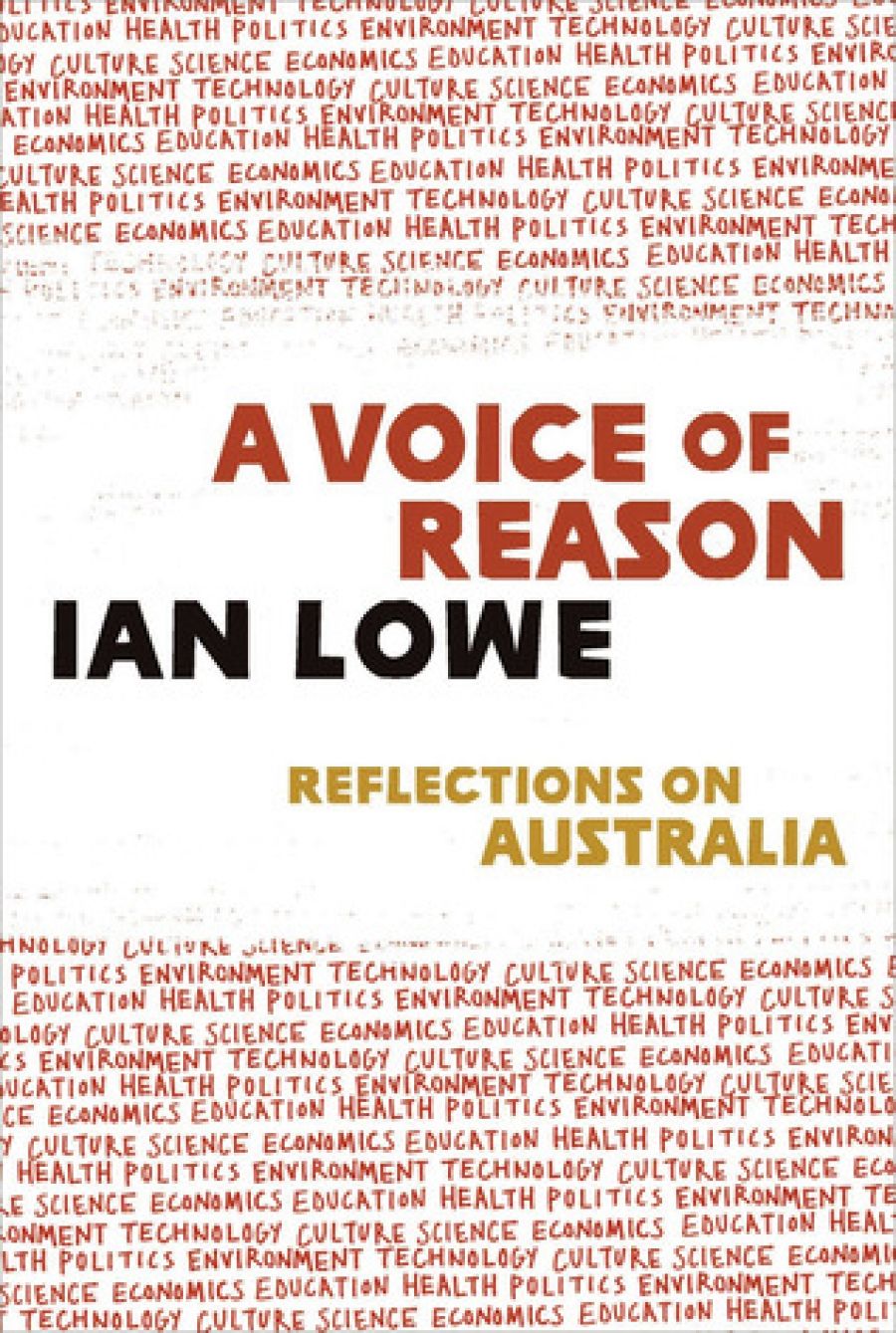
- Free Article: No
- Contents Category: Society
- Review Article: Yes
- Online Only: No
- Custom Highlight Text:
How effective is a voice of reason in a climate of fear? In his introduction to this book, Professor Ian Lowe, president of the Australian Conservation Foundation and Emeritus Professor of Science, Technology and Society at Griffith University says that he is ‘incorrigibly optimistic’ about the role of education in assisting us to make wise decisions about our future. Over the past twenty years, he has written twelve books, including A Big Fix: Radical solutions for Australia’s environmental crisis (2005) and Living in the Hothouse: How global warming affects Australia (2005), forty-five book chapters, more than thirty journal articles and six hundred columns for various publications. That work has been written for the general public, not just the scientific community.
- Book 1 Title: A Voice of Reason
- Book 1 Subtitle: Reflections on Australia
- Book 1 Biblio: University of Queensland Press, $34.95 pb, 264 pp
- Book 1 Readings Link: booktopia.kh4ffx.net/QmVQ6
Climate change is a global problem, caused by the combined action of the whole human population in using fossil fuels and clearing vegetation. The evidence is incontrovertible. Lowe bites the bullet about disagreement within the scientific community. He acknowledges that unconventional ideas and theories in science need to be explored, given that they may well end up as mainstream ideas in the future. However, ‘[s]cepticism, an honourable tradition within science, becomes denial when there is no longer an intellectually respectable case for disagreeing with mainstream science’. Interestingly, there is no formal code of ethics for scientists such as the Hippocratic oath for doctors. At the 1999 World Conference for Science, which called for such a code to be introduced, Nobel Laureate Joseph Rotblat argued that the code should extend to include respect for the global environment and responsibility for future generations.
Amazingly, given the scientific evidence, and the clear threats to the Great Barrier Reef, the Murray-Darling River system, the Kakadu Wetlands and our unique plants and animals, we face a national election in which neither major party will promise to do anything significant about addressing climate change. Not only have educated politicians refused to deal with the issues, but some have actively sought to convince the public that the scientific evidence is not there. Lowe reminds us that until the Whitlam government passed the Environmental Assessment (Impact of Proposals) Act in 1974, there was no requirement in this country to consider the consequences of development. Perhaps we need to amend the Australian constitution to make sustainability a priority for our governments.
Unfortunately, climate change deniers have been given coverage in the mass media that is ethically reprehensible. Lowe is critical of the simplistic ‘free trade and unlimited growth’ agenda of the Murdoch press. Ironically, roughly half of the articles in this book appeared in The Australian during 1990–91, in, as Lowe wryly puts it, ‘less ideologically blinkered times’ for that newspaper. To add to the misleading information in the press, there is the continuing problem of anti-intellectualism in Australian society. Researchers and academics are still considered by a large section of the community to be out of touch with the real world.
Lowe has been active internationally at attempts to forge a global response to climate change, including the Kyoto Protocol and the 2009 UN Convention in Copenhagen. He argues convincingly that we cannot afford to consider the global financial crisis in isolation from environmental issues. ‘The two main causes of environmental degradation are extreme poverty in the poor countries and unsustainable levels of consumption in the rich countries.’ At the Copenhagen Convention, Hugo Chavez from Venezuela said that ‘[if] climate change was a bank, it would already have been saved’.
On the principle of ‘think global, act local’, this book is full of practical ideas. School students will grow up with a clear sense of how to achieve a sustainable future if schools themselves model best practice ‘in their buildings, use of energy, water and resources, in the way their grounds value and protect biodiversity, and in their social inclusiveness’. Industries wanting to release new chemicals should bear the responsibility of establishing beyond reasonable doubt that the release will be safe.
Lowe is an excellent communicator. His writing is clear, lively, engaging and sometimes humorous. My only criticism is the occasional repetition of factual material.
Evil triumphs when good men do nothing. In his retirement, Ian Lowe persists with his mission to save us from ourselves. This book should be required reading for politicians, journalists and company directors – and for those members of the general public who are unconvinced of the reality or the significance of climate change.


Comments powered by CComment